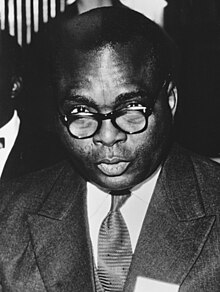
Jean Bolikango (Bolikango Akpolokaka Gbukulu Nzete Nzube, geb. 4. Februar 1909 gest. 17. Februar 1982) war ein Pädagoge, Schriftsteller und Politiker im Kongo. Er war zwei Mal Deputy Prime Minister der Republic of the Congo (République du Congo, Léopoldville): im September 1960 und von Februar bis August 1962. Er njoying substantial popularity among the Bangala people, he headed the Parti de l'Unité Nationale and worked as a key opposition member in Parliament in the early 1960s.
Bolikango began his career in the Belgisch-Kongo as a teacher in Catholic schools, and became a prominent member of Congolese society as the leader of a cultural association. He wrote an award-winning novel and worked as a journalist before turning to politics in the late 1950s. Though he held a top communications post in the colonial administration, he became a leader in the push for independence, making him one of the "fathers of independence" in the Congo. The Republic of the Congo became independent in 1960 and Bolikango attempted to organise a national political base that would support his bid for a prestigious office in the new government. He succeeded in establishing the Parti de l'Unité Nationale and promoted both a united Congo and strong ties with Belgium. Older than most of his contemporaries and commanding significant respect—especially among his Bangala peers, he was seen as the Congo's "elder statesman". Regardless, his attempts to secure a position in the government failed and he became a leading member of the opposition in Parliament.
As the country became embroiled in a domestic crisis, the first government was dislodged and succeeded by several different administrations. Bolikango served as Deputy Prime Minister in one of the new governments before a partial state of stability was reestablished in 1961. He mediated between warring factions in the Congo and briefly served once again as Deputy Prime Minister in 1962 before returning to the parliamentary opposition. After Joseph-Désiré Mobutu took power in 1965, Bolikango became a minister in his government. Mobutu soon dismissed him but appointed him to the political bureau of the Mouvement Populaire de la Révolution. Bolikango left the bureau in 1970. He left Parliament in 1975 and died seven years later. His grandson created the Jean Bolikango Foundation in his memory to promote social progress. The President of the Congo posthumously awarded Bolikango a medal in 2005 for his long career in public service.
